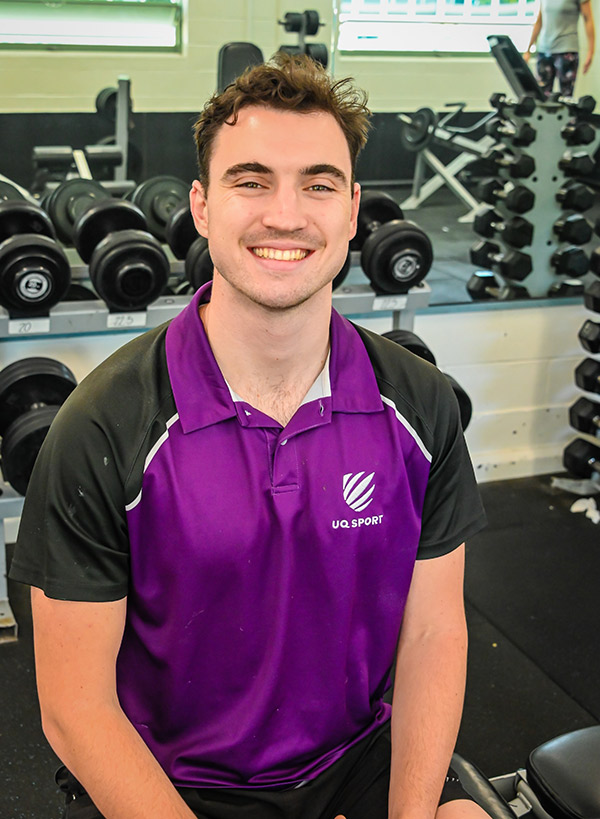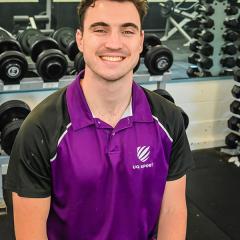Q&A with Bachelor of Exercise and Sport Sciences graduate Ethan Forge

What inspired you to study this program at UQ?
I had always been heavily involved in sports growing up on the Sunshine Coast. In high school I had an affinity to science and sport, so it was no brainer to study a degree in Exercise and Sport science. With UQ being one of the top institutions in the world for sport-related subjects and under 2 hours from where I grew up, it felt like the obvious choice for me.
Why did you choose UQ to study Exercise and Sport Sciences?
Funnily enough, I didn’t even have UQ in my preferences until about one week out from QTAC application cut-off. Coming from the coast, I didn’t think moving to Brisbane was really an option for me and I was more than happy to head to the local university. However, my school’s guidance counsellor made me aware that I had a good chance of being accepted to UQ with my grades and the rest was history!
What has been your most memorable moment at UQ?
It would be going on my first placement for my Healthy Populations course in 2nd year. This placement was the first opportunity I had to work with real clients and apply what I had learnt over the first 2 years of study to the community.
Having the trust of my supervisors and the opportunity to apply what I had learnt from the past 2 years of study was a big milestone in my professional journey and was one of my proudest moments in my degree. I loved being able to go out into the community and help others use exercise to improve their day-to-day life as well as join them on the journey to achieving their health/ performance goals.
What does a day in the life of an Exercise and Sports Science student look like?
Most of my days consisted of balancing work, training, and study all on the St Lucia campus. I was fortunate to work between the UQ Sport Aquatic and Fitness centres during my undergraduate studies. This allowed me the flexibility to study, train, and work within proximity of each other most days.
For upcoming Exercise and Sport Sciences students, an average day will consist of practical classes where you develop your hands-on skills and client soft skills. You’ll study either in the BSL (Biological Science Library) or Human Movement and Nutrition Sciences (HMNS) student area in between classes, with plenty of coffee trips in between.
The great thing about a HMNS degree is that a lot of our education is centred around movement and human interaction meaning that our study is not solely head in the books. It’s a great way to make friends whilst studying as well absorbing information.
Tell us about on of your industry placement experiences?
During my time at UQ I got to go on 2 practicum placements. My first was with The Movement Standard which is a private allied health practice located in Milton. I was under the guidance of some fantastic practitioners in exercise science and got to work closely with other allied health professionals such as Exercise Physiologists, Physiotherapists and Dieticians.
This placement was where I got to consolidate my learning and learn about my strengths and weakness at that stage of my professional development. With the support of the team at TMS, I got to develop my soft skills with client interaction, develop my ability how to time manage when working with multiple clients within a day, and then also staying up to date with effective, evidence-based practices. I couldn’t recommend that experience any higher for upcoming exercise science students.
My second placement was with the Queensland Academy of Sport (QAS) and was in my final semester. This opportunity was incredible and allowed me to work with Paralympians and Olympians in my day-to-day work. I got to work under some of the best sport scientists in the country and learn from their decades of experience and how they approach creating world class sport science services for our state and national sporting programs. Both experiences were career shaping for myself, and I may not have had these opportunities if I didn’t have the support from my supervisors and staff within the School of Human Movement and Nutrition Sciences.
How did you manage to balance your study, work, and other extracurricular activities?
This was a challenge and something I had to work on throughout my degree. Around the 2nd year of my degree, I really had a wake-up call about needing to find a healthy balance between study and work. I found that using my Sundays as a reset day was super helpful in allowing me to take a step back from the craziness of the week and be able to reflect on the good, the not so good and the focus points for the upcoming week.
This reset day with as well as some super understanding friends who knew that I may not get to see them as often during exam time, were crucial in maintaining that healthy balance.
What are the most valuable skills you have learnt while studying Exercise and Sport Science?
The most valuable skills would be the ability to run performance tests on clients under a tight time frame or being able to make changes to the protocols as the situation requires. My experience at the QAS showed me that the most effective and useful practitioners to an organisation or teams are the ones who have a strong foundation of knowledge of the human body.
With this knowledge, you can adapt your plans in the moment to still provide valuable data for the coaches and athletes, but can respond to any changes to the environment, which is very common in the world in sport. An example would be being able to adapt a testing battery if the athlete arrives with an injury that only occurred at the previous night’s training.
Outside of the things that specifically help in my role, I believe this degree has helped developed my soft skills and team collaboration. In the competitive world of elite sports, being able to work well as part of a team is a common trait among the top teams and organisations.
How have your teachers had a positive impact on your studies?
The staff within the HMNS school have always been willing to go above and beyond to support students on their journeys. I can’t count the number of times I have come knocking on a professor’s door to clarify an assignment question or seek advice on the best way to break into the elite sporting world. I don’t think I would be the practitioner I am today if it wasn’t for certain staff members being so willing to guide my passion and interests with their experience.
How do you feel your studies have best prepared you for your future career?
The UQ advantage is very real within sport sciences, and the industry connections and high quality of our sport related subjects have been the best preparation any student can ask for.
At the start of my degree, I only had a vague idea of the opportunities that were out there. Now at the end of my undergrad degree, I can confidently say I feel prepared and capable to make the most of those opportunities and make a successful career for myself as an Exercise and Sport Scientist.
One thing that I don’t think gets talked about enough is the opportunity we have as sport scientists to help the community as well. My time at UQ allowed me to work with not only elite Paralympians and Olympians but also grass-root level sport and connect with communities in rural and regional Queensland.
What drove you to become a high achieving student?
My family were a huge influence on my drive for progressing. Coming from a family who supported each other in our dreams and aspirations and were quite successful in their own fields, I wanted to be next in the family to go for gold in my field. Another contributing factor for my drive to achieve is that neither of my parents attended University as they pursued work immediately after high school. I developed a drive to not only graduate university but to use my time at UQ to make some lifelong networks and friendships to help with future aspirations.
Would you like to share any major obstacles or hardships you have overcome throughout your studies?
I think one of the major hurdles I’ve had to face is the feeling that “I don’t know enough”. As I progressed through my degree, I would go from feeling confident in having a solid foundation of knowledge in a topic to then being humbled the following semester.
Reflecting now, I believe this feeling of “being behind the 8-ball”, so to speak, started off as insecurity and became one of my greatest skills. That drive to keep up with my learning as I was being faced with new and more complex questions every day, shaped me into the sport scientist I am today. I have a lot to still learn, but I believe that’s all a part of the journey.
What are you most passionate about?
My current passion is undoubtedly Para-Sports. I didn’t have much experience in Para-Sport until university, where I got involved with the ParaStart research program. This research program is a longitudinal study which is examining the benefits that sports-based training in Swimming and Athletics can have for High-Support Need athletes.
It’s a field that deserves as much research, funding and public interest as its able-bodied counterparts receive, if not more! With a home Olympics within the next decade, I would love to see attendance and viewership for the Paralympics be on an equal playing field as the Olympics.
What advice would you give future UQ students?
Take every opportunity that presents itself. In sport, everyone knows each other, and I’ve found the most progress in my early career by connections I made early on. It could have been as simple as a 10-minute conversation at the pool turning into an exciting career opportunity.
A saying I try to keep in mind is “Opportunity knocks at least once every two weeks; you just have to be ready to listen for it and open those doors”. You will have days where it feels like nothing is moving and uni is overwhelming, and other days where you can’t even keep up with all the exciting changes!
If you keep yourself prepared by upskilling yourself in your free time, zoning in on what puts a fire in your belly, and searching for things that give you that feeling, you can be ready for any opportunity that may come your way.
What’s next for you?
The next goal for me is to gain more field experience in 2023 within sport. I will be returning to a state-wide talent identification program called YouFor2032 at the Queensland Academy of Sport from March to June.
Then, hopefully I’ll be able to start a post-graduate degree so that I can add to the world of Para-Sport research. The goal being, to try and build on our current knowledge in High Performance Para-Sport and maximise our potential to not only win medals in 2032 but also help the athletes as people first and foremost.
Want to pursue a sporting career just like Ethan? Learn more about UQ's Bachelor of Exercise and Sports Sciences (Honours).

